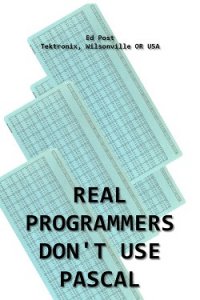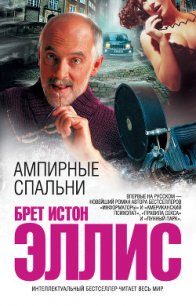Real Programmers Don't Use PASCAL. - Post Ed (книги онлайн читать бесплатно .TXT) 📗

Жалоба
Напишите нам, и мы в срочном порядке примем меры.
Real Programmers Don't Use PASCAL. - Post Ed (книги онлайн читать бесплатно .TXT) 📗 краткое содержание
Классический текст. Для настоящих программистов и тех, кто хочет таковым стать.
Real Programmers Don't Use PASCAL. читать онлайн бесплатно
Real Programmers Don't Use Pascal
[ A letter to the editor of Datamation, volume 29 number 7, July 1983. I've long ago lost my dog-eared photocopy, but I believe this was written (and is copyright) by Ed Post, Tektronix, Wilsonville OR USA.
Back in the good old days-- the "Golden Era" of computers-- it was easy to separate the men from the boys (sometimes called "Real Men" and "Quiche Eaters" in the literature). During this period, the Real Men were the ones who understood computer programming, and the Quiche Eaters were the ones who didn't. A real computer programmer said things like "DO 10 I=1,10" and "ABEND" (they actually talked in capital letters, you understand), and the rest of the world said things like "computers are too complicated for me" and "I can't relate to computers-- they're so impersonal". (A previous work [1] points out that Real Men don't "relate" to anything, and aren't afraid of being impersonal.)
But, as usual, times change. We are faced today with a world in which little old ladies can get computers in their microwave ovens, 12 year old kids can blow Real Men out of the water playing Asteroids and Pac-Man, and anyone can buy and even understand their very own personal Computer. The Real Programmer is in danger of becoming extinct, of being replaced by high school students with TRASH-80s.
There is a clear need to point out the differences between the typical high school junior Pac-Man player and a Real Programmer. If this difference is made clear, it will give these kids something to aspire to-- a role model, a Father Figure. It will also help explain to the employers of Real Programmers why it would be a mistake to replace the Real Programmers on their staff with 12 year old Pac-Man players (at a considerable salary savings).
The easiest way to tell a Real Programmer from the crowd is by the programming language he (or she) uses. Real Programmers use Fortran. Quiche Eaters use Pascal. Nicklaus Wirth, the designer of Pascal, gave a talk once at which he was asked, "How do you pronounce your name?". He replied, "You can either call me by name, pronouncing it 'Veert', or call me by value, 'Worth'." One can tell immediately by this comment that Nicklaus Wirth is a Quiche Eater. The only parameter passing mechanism endorsed by Real Programmers is call-by-value-return, as implemented in the IBM/370 Fortran G and H compilers. Real Programmers don't need all these abstract concepts to get their jobs done-- they are perfectly happy with a keypunch, a Fortran IV compiler, and a beer.
Real Programmers do List Processing in Fortran.
Real Programmers do String Manipulation in Fortran.
Real Programmers do Accounting (if they do it at all) in Fortran.
Real Programmers do Artificial Intelligence programs in Fortran.
If you can't do it in Fortran, do it in assembly language. If you can't do it in assembly language, it isn't worth doing.
The academics in computer science have gotten into the "structured programming" rut over the past several years. They claim that programs are more easily understood if the programmer uses some special language constructs and techniques. They don't all agree on exactly which constructs, of course, and the example they use to show their particular point of view invariably fit on a single page of some obscure journal or another-- clearly not enough of an example to convince anyone. When I got out of school, I thought I was the best programmer in the world. I could write an unbeatable tic-tac-toe program, use five different computer languages, and create 1000 line programs that WORKED (Really!). Then I got out into the Real World. My first task in the Real World was to read and understand a 200,000 line Fortran program, then speed it up by a factor of two. Any Real Programmer will tell you that all the Structured Coding in the world won't help you solve a problem like that-- it takes actual talent. Some quick observations on Real Programmers and Structured Programming:
Real Programmers aren't afraid to use GOTOs.
Real Programmers can write five page long DO loops without getting confused.
Real Programmers like Arithmetic IF statements-- they make the code more interesting.
Real Programmers write self-modifying code, especially if they can save 20 nanoseconds in the middle of a tight loop.
Real Programmers don't need comments-- the code is obvious.
Since Fortran doesn't have a structured IF, REPEAT ... UNTIL, or CASE statement, Real Programmers don't have to worry about not using them. Besides, they can be simulated when necessary using assigned GOTOs.
Data structures have also gotten a lot of press lately. Abstract Data Types, Structures, Pointers, Lists, and Strings have become popular in certain circles. Wirth (the above mentioned Quiche Eater) actually wrote an entire book [2] contending that you could write a program based on data structures, instead of the other way around. As all Real Programmers know, the only useful data structure is the Array. Strings, Lists, Structures, Sets-- these are all special cases of arrays and can be treated that way just as easily without messing up your programming language with all sorts of complications. The worst thing about fancy data types is that you have to declare them, and Real Programming Languages, as we all know, have implicit typing based on the first letter of the (six character) variable name.
What kind of operating system is used by a Real Programmer? CP/M? God forbid-- CP/M, after all, is basically a toy operating system. Even little old ladies and grade school students can understand and use CP/M.
Unix is a lot more complicated of course-- the typical Unix hacker never can remember what the PRINT command is called this week-- but when it gets right down to it, Unix is a glorified video game. People don't do Serious Work on Unix systems: they send jokes around the world on UUCP-net and write Adventure games and research papers.
No, your Real Programmer uses OS/370. A good programmer can find and understand the description of the IJK305I error he just got in his JCL manual. A great programmer can write JCL without referring to the manual at all. A truly outstanding programmer can find bugs buried in a 6 megabyte core dump without using a hex calculator. (I have actually seen this done.)
OS is a truly remarkable operating system. It's possible to destroy days of work with a single misplaced space, so alertness in the programming staff is encouraged. The best way to approach the system is through a keypunch. Some people claim there is a Time Sharing system that runs on OS/370, but after careful study I have come to the conclusion that they were mistaken.
What kind of tools does a Real Programmer use? In theory, a Real Programmer could run his programs by keying them into the front panel of the computer. Back in the days when computers had front panels, this was actually done occasionally. Your typical Real Programmer knew the entire bootstrap loader by memory in hex, and toggled it in whenever it got destroyed by his program. (Back then, memory was memory-- it didn't go away when the power went off. Today, memory either forgets things when you don't want it to, or remembers things long after they're better forgotten.) Legend has it that Seymore Cray, inventor of the Cray I supercomputer and most of Control Data's computers, actually toggled the first operating system for the CDC7600 in on the front panel from memory when it was first powered on. Seymore, needless to say, is a Real Programmer.
One of my favorite Real Programmers was a systems programmer for Texas Instruments. One day, he got a long distance call from a user whose system had crashed in the middle of saving some important work. Jim was able to repair the damage over the phone, getting the user to toggle in disk I/O instructions at the front panel, repairing system tables in hex, reading register contents back over the phone. The moral of this story: while a Real Programmer usually includes a keypunch and line printer in his toolkit, he can get along with just a front panel and a telephone in emergencies.




